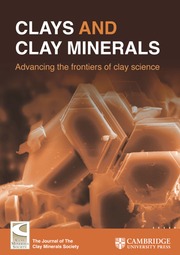Article contents
Sorption of Naringin from Aqueous Solution by Modified Clay
Published online by Cambridge University Press: 01 January 2024
Abstract
The flavonoid naringin is the main source of the undesirable bitter taste in some citrus juices. In commercial debittering processes, the naringin is adsorbed on non-ionic polymeric resins. Organo-clays (OCs), which have been used as sorbents for organic pollutants, could also have affinity for the naringin molecule, and thus potentially could serve as a debittering agent. The objective of the present study was to characterize the sorption capacity of a prepared OC to evaluate its ability to remove naringin from aqueous solutions, investigating the effect of adsorbent dose, initial concentration of naringin, temperature, contact time, and pH. The OC was prepared by the intercalation of cationic surfactant hexadecyltrimethylammonium bromide in a Mexican bentonite. The host clay and the OC were characterized by X-ray diffraction, Fourier-transform infrared, and nitrogen gas adsorption. The OC showed a surface area of 9.3 m2 g-1, 11.35 nm average pore diameter, and a basal spacing, d001, of 2.01 nm. The adsorbent removed naringin at the rate of 60-72% at 25°C and pH 3. The sorption capacity increased with pH and temperature. Experimental data were well fitted by both Langmuir and Freundlich adsorption models. Most of the sorption took place during the first 10 min and the equilibrium time was reached within 720 min. The rate of sorption was adjusted to pseudo second-order kinetics.
- Type
- Article
- Information
- Copyright
- Copyright © Clay Minerals Society 2012
References
- 6
- Cited by


